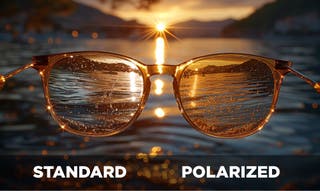POLARIZED SUNGLASSES | PROS & CONS
Polarized sunglasses are a must-have for those seeking to reduce glare, enhance clarity, and improve comfort in bright conditions. They're especially popular among drivers, water sports enthusiasts, and anyone who spends a lot of time outdoors. Like any technology, though, polarization has its pros and cons. We’ll break them down to help you decide if polarized sunglasses are the right choice for you.
Pros of Polarization
- Reduced Glare: By filtering the light that reflects off flat surfaces (like water, roads, other cars, or snow), these lenses reduce the strain on your eyes, making outdoor activities safer and more enjoyable.
- Clearer Vision: With the glare gone, the world looks crisper and clearer. Colors appear more vibrant and details are more defined. This enhances your overall visual experience.
- Reduced Eye Strain: Squinting in bright light leads to eye fatigue and headaches. Polarized lenses reduce the need to squint, keeping your eyes more comfortable and reducing the risk of discomfort.
- Better Water Visibility: For activities like fishing or boating, polarized lenses are a game-changer. They allow you to see through the surface of the water more easily, spotting fish or underwater hazards that non-polarized lenses would miss.
EXPLORE POLARIZED SUNGLASSES
Cons of Polarization
- Difficulties with LCD Screens: Polarized lenses can block out some of the light from your smartphone, GPS devices, and other LCD screens. This can be inconvenient or even problematic in situations where visibility of these screens is crucial.
- Price: Polarized sunglasses tend to be more expensive than their non-polarized counterparts. Most agree that the benefits justify the cost, but it's something to consider if you're on a tight budget.
- Potential Misinterpretation of Hazards: By eliminating glare, polarized lenses can sometimes make icy patches on the road or other slick surfaces less visible. This might lead to misjudging conditions in certain environments.
- Lowered Contrast in Low-Light Situations: Driving at night with polarized glasses is not recommended, since polarization reduces contrast and may make road conditions more difficult to read.
EXPLORE STANDARD SUNGLASSES
Should you buy polarized sunglasses? Here is our expert recommendation.
Buy polarized sunglasses if you spend a lot of time outdoors, especially near water or driving. The benefits of reduced glare and clearer vision can significantly enhance your experience.
Don't buy polarized sunglasses if you rely heavily on viewing LCD screens for work or navigation outdoors.
In the end, the best choice is one that aligns with your needs and ensures both comfort and functionality.
EXPLORE BEST SELLING SUNGLASSES
YOU ASKED – WE ANSWERED
Polarized lenses contain a special filter that blocks intense reflected light, reducing glare and improving visual clarity.
If you're often outdoors, especially near water or snow, then yes. They reduce glare, enhance visibility, and reduce eye strain. For general use, non-polarized might suffice and be more budget-friendly.
Look through the lenses at a digital screen and rotate them. If the screen appears to darken and lighten, the lenses are polarized.
No, UV blocking protects eyes from harmful ultraviolet rays, while polarization reduces glare from reflective surfaces. Some sunglasses offer both.
Reduces glare, enhances contrast, improves visual clarity, and reduces eye strain.
May make it difficult to read LCD screens, can be more expensive, and not suitable for all sports or activities.
The "best" depends on personal preference, lens materials, and specific needs. Consider lens quality and UV protection.
Not necessarily darker, but they reduce glare through polarization and provide clearer, more comfortable vision in bright conditions.
Latest Articles

Men’s Watches for Every Occasion: From 9–5 to After Hours
Back to early commutes, long meetings, and after-work fun – your watch has to keep up. The right men's watch isn't just for telling time – it's a glimpse into your personality, showcasing how you manage your day and how stylish you prefer to look. A great watch moves with you, from desk to dinner table, maintaining your style from morning coffee to late-night cab rides.

How to Wear a Tote Bag as a Man with Style
A tote bag is perhaps the simplest bag of all. It has one open compartment, two handles, and no unnecessary extras. It’s become seriously popular in recent years, and for good reason.

How to Choose Swimwear Color for Men Based on Skin Tone
Your skin tone isn't just about how light or dark it is. What really counts is the undertone lurking beneath. That undertone? It's the reason some colors make you look like a bronze god, and others make you look like you’ve had a rough night.

Watch Size Guide For Men: Find Out Which Watch Fits You
Find your ideal watch size for your build with our comprehensive guide for men. Get tips on fit and style to ensure your watch looks great and feels comfortable!

How to Clean Your Watch - A 5-Step Guide
Want to keep your watch gorgeous? Check out our 5-step guide on how to clean your watch effectively and maintain its wow factor for years to come!

How to wear multiple rings | a men's guide
Discover the ultimate men's guide on how to wear multiple rings stylishly. Elevate your look with tips and tricks for pairing rings.

Easy guide to cleaning men’s earrings
Learn the best methods for cleaning men's earrings. Our step-by-step guides will help you maintain their shine and keep them looking stylish every day!
.jpg?format=pjpg&auto=webp&quality=75%2C90&width=640)
Top 5 Accessory Looks for Men April 2025
Check out the top 5 must-have accessory looks for men in April 2025! Get inspired to elevate your fashion game and express your unique style.
.jpg?format=pjpg&auto=webp&quality=75%2C90&width=640)
Top 5 Accessory Looks for Men March 2025
Unveil the top 5 accessory looks for men in March 2025! Stay ahead in fashion with essential tips to upgrade your outfits and make a statement.

QUARTZ VS. AUTOMATIC WATCHES: WHICH SHOULD YOU CHOOSE?
Explore the pros and cons of quartz and automatic watches. Make an informed choice for your next timepiece with our detailed comparison and insights!


